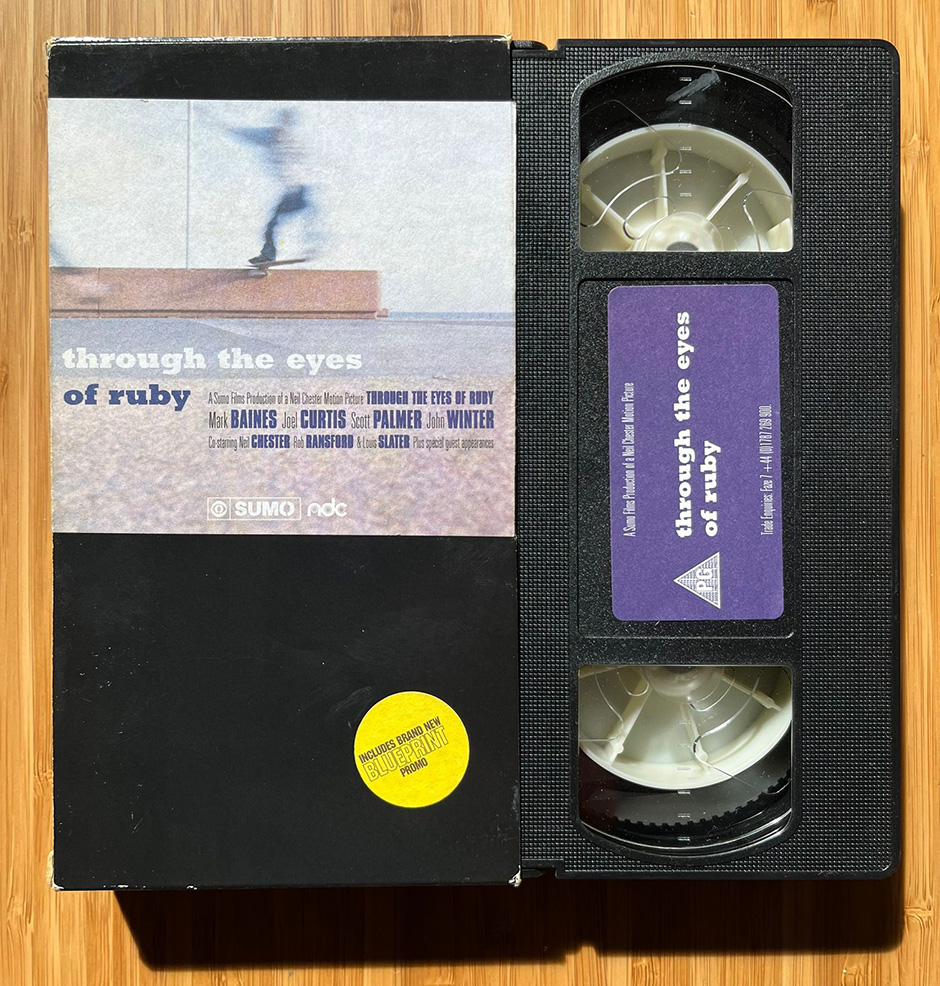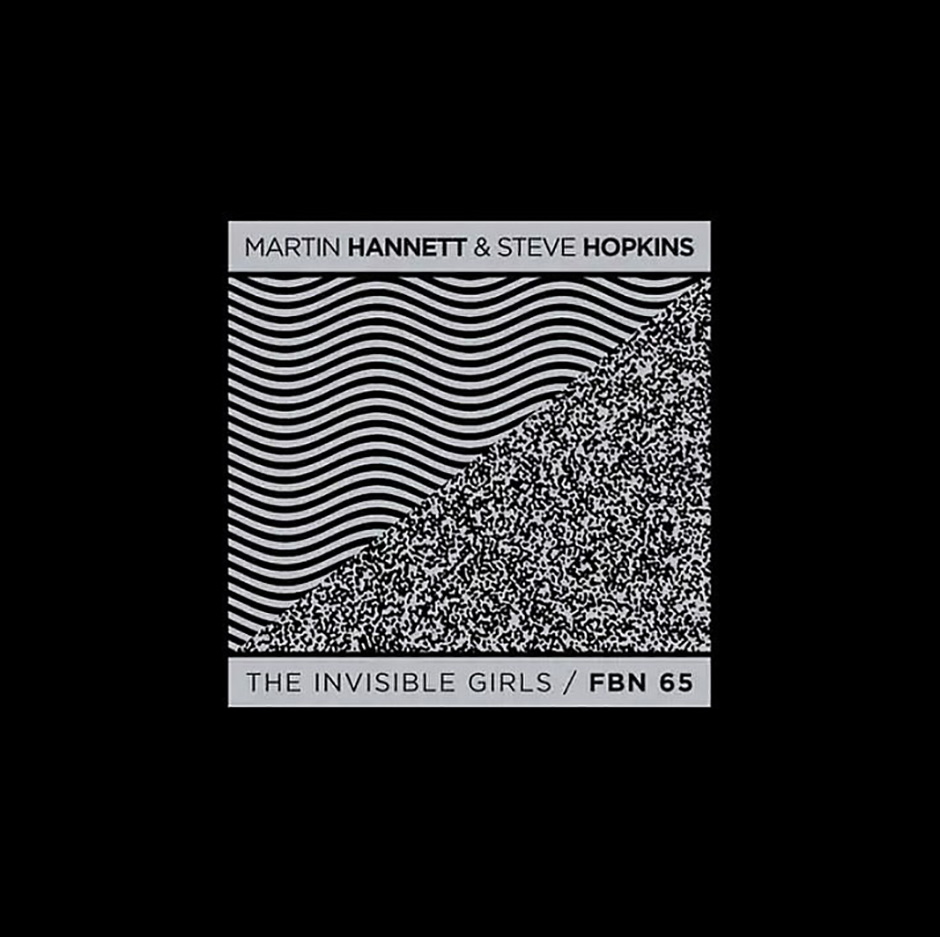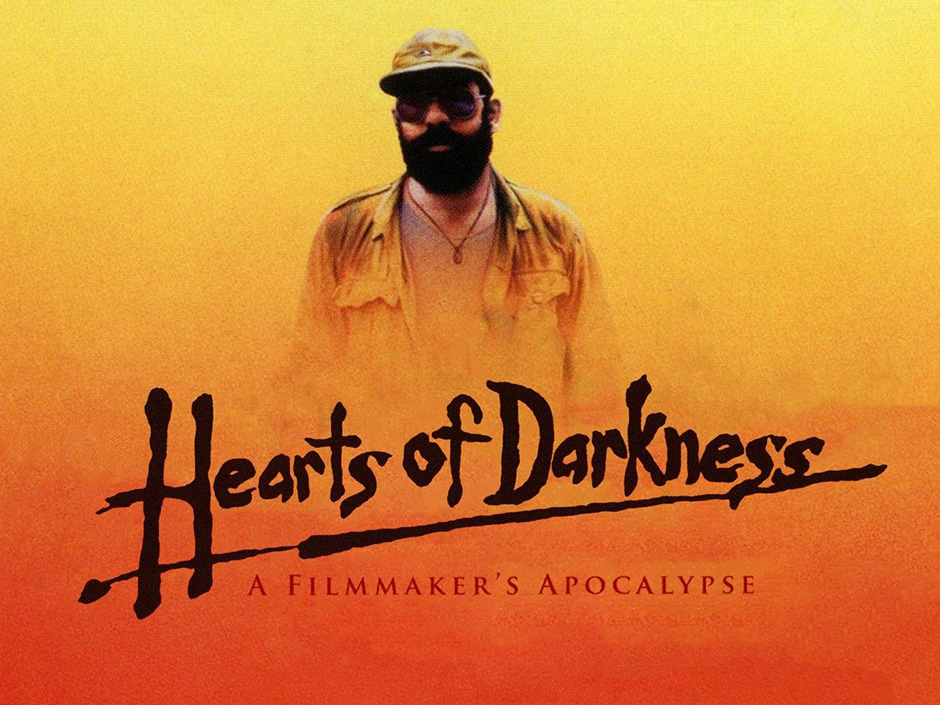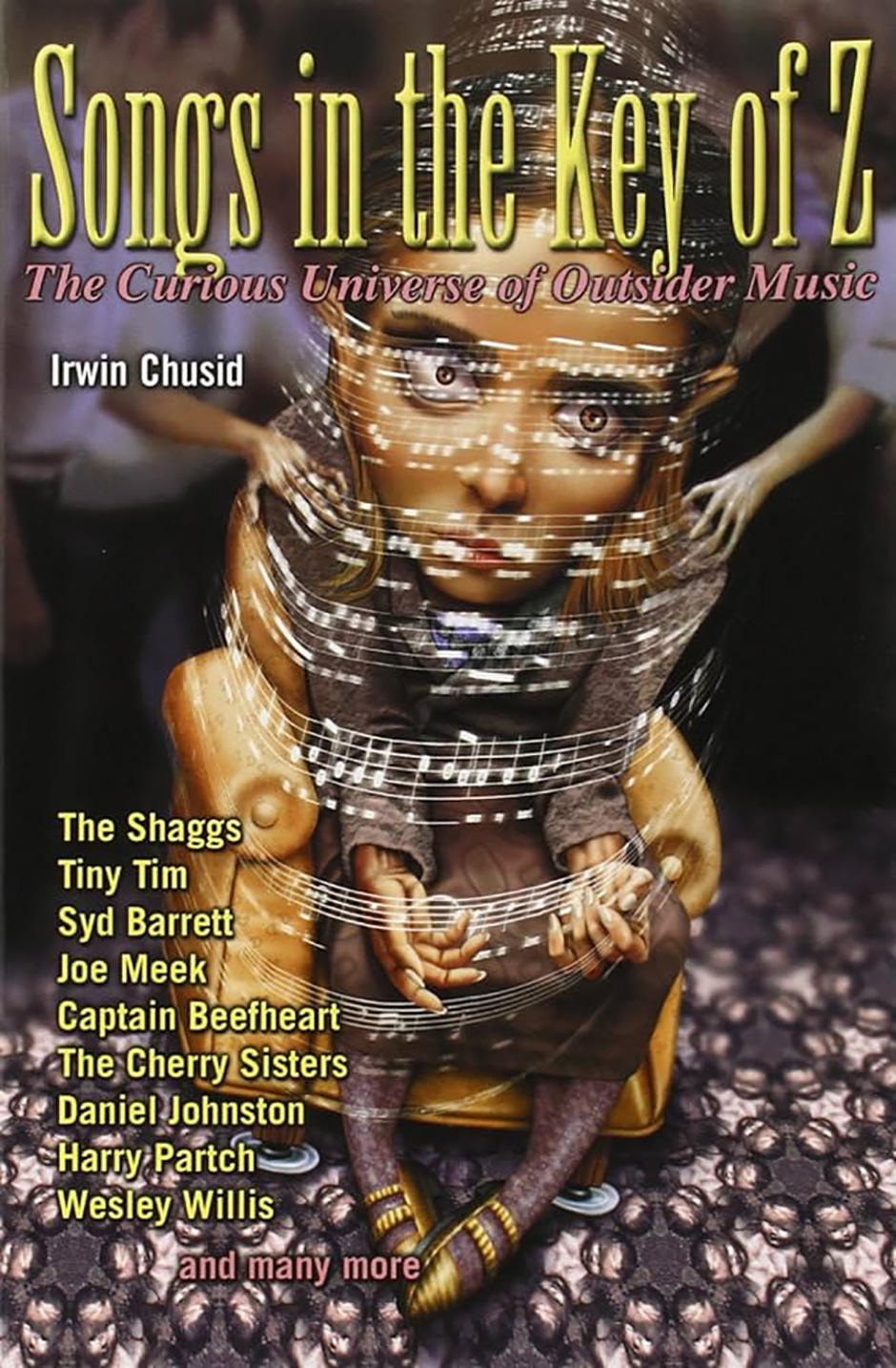For our latest “Offerings” interview we checked in with Matlok Bennett-Jones whose thoughtful selection has played a part in his rehabilitation from injury. Find out which skate video, album, documentary, and book he chose to share with you…
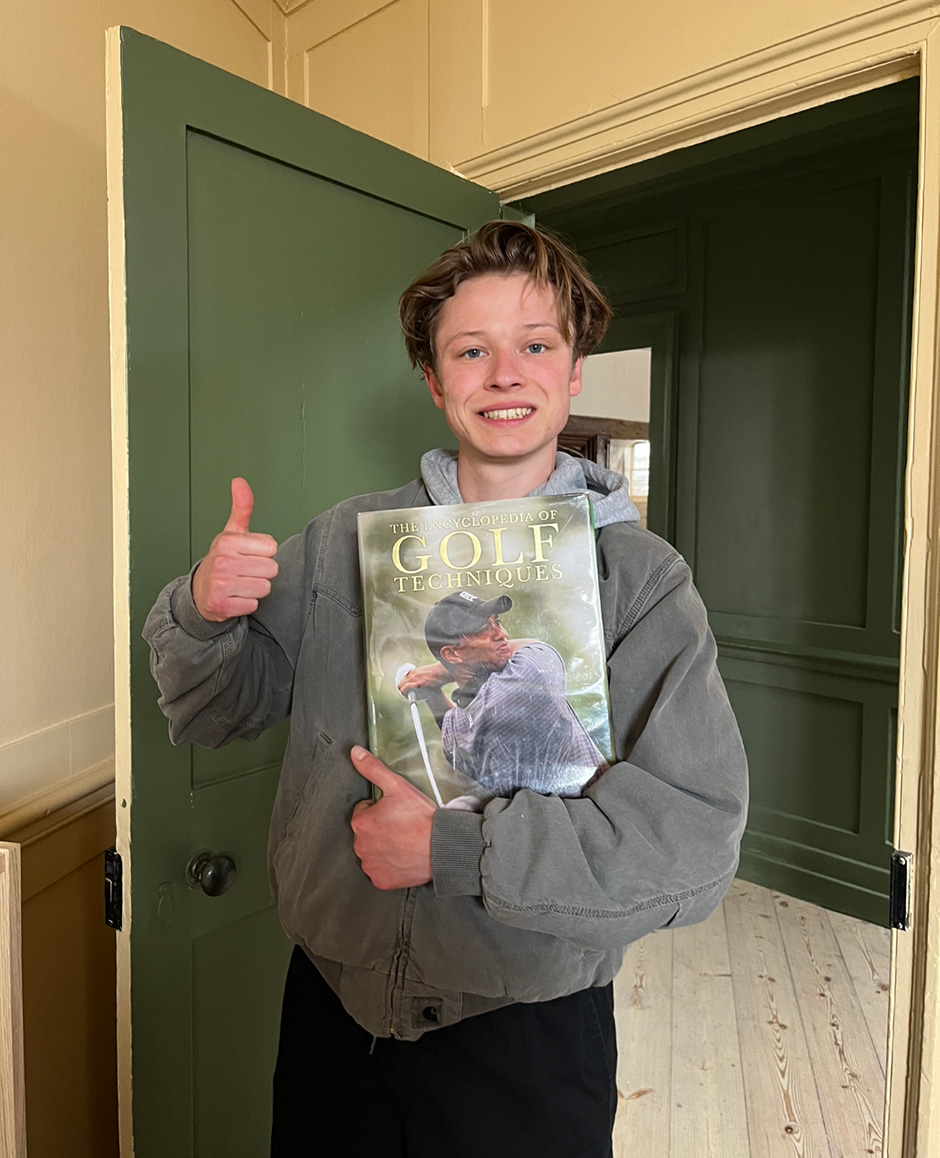
words and interview by Jacob Sawyer. Matlok Bennett-Jones improving his swing on a museum visit
Matlok Bennett-Jones comes from a long line of legends who cut their teeth on the streets of Sheffield. When he first relocated to London he became a welcome addition to the staff here at Slam during the time when our second Covent Garden location sat next door to our favourite pub. He is part of an elite crew of Slam alumni who have gone from helping our customers pick their next whip off the board wall to having their name up there with the best of them. It still makes us smile every time we open the latest box of boards from Passport and see Matlok’s name in the mix.
His time working with us was unfortunately fairly short-lived, but he soon became a friendly face at the Palace shop a short walk away into Soho. When skating for Passport became a professional affair he stepped away from any nine-to-five activity to free up time to focus solely on skateboarding. This was going well until an errant 50-50 on a handrail at the tail end of last summer led to a torn meniscus, a torn ACL, and the long road to recovery. Thankfully this has gone smoothly, meaning he will be back in action by the time the good weather hits. The tail end of the rehabilitation process seemed like a good moment for this interview, and it was great to speak about everything he picked out for us.
These interviews always bolster the book pile, and open up new life-enriching avenues. This one brought a meditative music element, gifted me new appreciation for an old film, and presented a portal into the tail end of the nineties through Neil Chester’s lens. It was a pleasure talking about a video which has remained a real constant for Matlok. This was a VHS tape on the counter of skate shops country-wide long before he even picked up a skateboard. Courtesy of a thoughtful reissue by Mark Baines this memorable scene video managed to reach, and inspire a whole other generation. Hopefully this recommendation will continue to help it find some fresh eyes.
Once you have treated yourself to some UK skate history find out more about a record full of songs recorded by Factory Records’ very own Martin Hannett. These lesser-known moods, and recordings are guaranteed to take you on a voyage beyond what you may expect. Then take in Hearts of Darkness which revels in, and reveals the chaos that birthed one of the most famous films of all time. Finally, find out about a book full of outsider musicians you may never have heard of before a brief check in about recent developments. We hope this selection will take you on a journey of your own, and look forward to seeing some new Matlok footage in no time.
Sumo-Through The Eyes Of Ruby (1998)
How did this video find you?
I guess you could say I got the second wave of exposure to this video. I wasn’t even skating when it came out, I started in about 2003. I wouldn’t have been aware of SUMO or any of that. But when STORY was around, [Mark] Baines’s skate shop, that was around the time when I first started going to Devonshire Green, and into town. I would have been about thirteen. Baines did the STORY Filmmakers Guild, reissuing old videos. He did a DVD which had Through The Eyes Of Ruby, Steady, Driving South, and Hating Life. I think I just went in and bought the DVD, or maybe I bought a board and he gave me one.
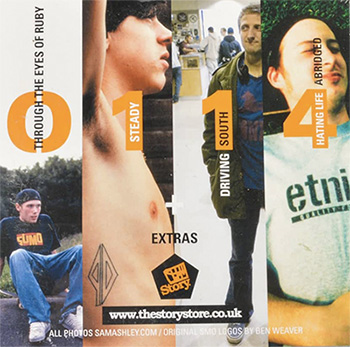 I had probably seen a skate video before that, but that was the first one which made an impact. Especially with Through The Eyes Of Ruby, so many of this spots in it are in Sheffield, and I recognised loads of them. Then I started going into the city more, It would have been the first time I became consciously aware of spots, and what had been done there. The beginning of my understanding of what street skating is really. I think the only other video I had seen at that time would have been Blind What If? So this was a totally different type of video.
I had probably seen a skate video before that, but that was the first one which made an impact. Especially with Through The Eyes Of Ruby, so many of this spots in it are in Sheffield, and I recognised loads of them. Then I started going into the city more, It would have been the first time I became consciously aware of spots, and what had been done there. The beginning of my understanding of what street skating is really. I think the only other video I had seen at that time would have been Blind What If? So this was a totally different type of video.
Who made the most impact on you?
I was completely obsessed with [Mark] Baines’s part, Scott Palmer’s part, and Joel [Curtis]’s part. They really stood out to me, even re-watching it again recently. I watched it yesterday having not watched it for a few months, it’s just so sick. I love how Joel’s part opens with just a fat drop off a wall. There’s something so sick about the start where he’s just tanking it, and carving that bank, it’s so powerful. Joel was definitely one of my favourite skaters growing up.
It’s rad that Baines put out that DVD, it gave a whole new generation an idea of the strong scene that came before, something to be proud of.
Definitely, everyone is in that video. I’d love to ask Ches [Neil Chester] more about it, how long it took to make, and get some behind the scenes tales of it coming together. One thing I really love about that video is the random Huntington Beach footage that crops up. Especially Baines’s part, there’ll be the bleakest Sheffield spots cut with him nollie tailsllding a rail in the States. The locations in skate videos are sometimes so weird, different, and come out of nowhere. Then when you return from some footage filmed in LA to the UK it looks even more bleak, hahaha, so good. It’s probably my favourite Baines part just because of when I watched it. That Elliot Smith tune is one of my favourites ever, and it works so well.
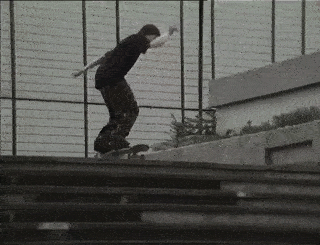 The way it’s all edited is just so cool, I love the part where there’s a drum fill and it cuts to the sequence of him doing a blindside-fakie nosegrind-shuvit at the old Crucible. That editing really resonated with me. Another thing that was really cool was seeing those spots, by the time I was skating they weren’t there, Crucible was a completely different place, it was crazy thinking there was ledge there once, or that you could skate some stairs. I think that’s the thing with this video, it was always a point of reference when I started skating the city. Joel [Curtis] does a backside 180 down the Odeon 12 in his part. I had never been around it when there weren’t blind bumps there but people would point out what had been done there. I think Smithy [Neil Smith] nollied them too, and it felt at the time like that was just impossible you could skate stairs that big. The stairs are quite short but the steps are so high, it’s insane, I couldn’t understand it.
The way it’s all edited is just so cool, I love the part where there’s a drum fill and it cuts to the sequence of him doing a blindside-fakie nosegrind-shuvit at the old Crucible. That editing really resonated with me. Another thing that was really cool was seeing those spots, by the time I was skating they weren’t there, Crucible was a completely different place, it was crazy thinking there was ledge there once, or that you could skate some stairs. I think that’s the thing with this video, it was always a point of reference when I started skating the city. Joel [Curtis] does a backside 180 down the Odeon 12 in his part. I had never been around it when there weren’t blind bumps there but people would point out what had been done there. I think Smithy [Neil Smith] nollied them too, and it felt at the time like that was just impossible you could skate stairs that big. The stairs are quite short but the steps are so high, it’s insane, I couldn’t understand it.
What elders from this video were around when you were starting?
When I started skating and meeting people they were mainly from the generation in between them and me. I didn’t really meet [Mark] Baines properly or start skating with him until I was about sixteen. When I was going to Dev Green, or the House, it was the generation in the middle, people like Jerome [Campbell], Ash Hall, and Shaun Currie. What was cool was that because I didn’t start skating with any of the guys in it straight away, they had this kind of celebrity about them almost. It made it even funnier, I remember years later going to the pub when I was eighteen, meeting Rob Ransford for the first time and fanning out over meeting him. He wasn’t really skating at that point, just a bloke, a legend, it made it so much cooler. I told him about watching his shared part with Ches [Neil Chester], and he couldn’t believe I was stoked on that, so good.
“This video played a big part in my life from thirteen to sixteen, I was watching it all the time, it was embedded in my brain”
I ended up meeting Joel [Curtis] properly a lot later on and it was the same thing. Growing up locally Joel, and Baines, were always just my favourite skaters. Landscape was the first board brand I ever skated for and one reason I really wanted to do that was because Joel had been a part of that. You look up to these people, then get to meet them and they’re really cool. I love bumping into Joel, or bumping into Seth [Curtis] in London is always really nice.
Watching this video back it shows how next level Baines was at this point in time. We were lucky to see some of what he was filming go down. He was ahead of his time really. It felt like any time he was out for the day he’d film something incredible.
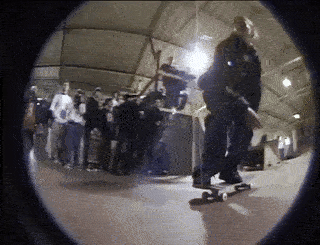 His part is so good, I’m such a huge fan of videos where you get demo footage, or random park footage in your part. He does a nollie 540 from a quarter onto a bank, and everyone is cheering, it’s so sick. You don’t really see that any more, that kind of died, any park footage, or especially demo footage in your part. It’s a nollie 360 really but it spins so much that it looks like a 540. Thinking of [Rob] Ransford’s part too, there’s sick skating in there but also footage of him skating a jump ramp doing Christ Airs and shit.
His part is so good, I’m such a huge fan of videos where you get demo footage, or random park footage in your part. He does a nollie 540 from a quarter onto a bank, and everyone is cheering, it’s so sick. You don’t really see that any more, that kind of died, any park footage, or especially demo footage in your part. It’s a nollie 360 really but it spins so much that it looks like a 540. Thinking of [Rob] Ransford’s part too, there’s sick skating in there but also footage of him skating a jump ramp doing Christ Airs and shit.
There’s stuff Ches filmed in London, and bits Dan Magee donated to the video too. This must have put some London spots on your radar before you saw them for yourself.
This video played a big part in my life from thirteen to sixteen, I was watching it all the time, it was embedded in my brain. So by the time I started coming to London, and eventually moved here I was realising where things were. It definitely made me think I would have loved to have skated Shell Centre when it was there. That spot looked so fun. It would have been the first time I saw Viccy Benches, I remember going there for the first time and I definitely had Baines’s lines there from this video playing in my head. I really wanted to film a line there, filmed it, then realised that Lucien [Clarke] had done the trick I was trying in a better line, hahaha.
Baines’s opening line at Knightrider too is so good. When I first moved here I’d walk around there quite a lot because I go to a gym that’s near there. Some lines or tricks link up with music so well, and the way that opening line goes with the start of that song really sticks in your head. I remember going there a few times when Tom [Knox] was filming his part there, and just thinking it’s insane that you could skate all of those stairs in a row, and then skate this sick out ledge at the end.
Some bits of London stood out for me but I just really associate this with Sheffield. Any time I feel like I want to go back to Sheffield to see everyone, and skate The House, or Dev Green, I just watch this video and get so hyped.
Any immediate influences from this video? Or tricks you learned because of it?
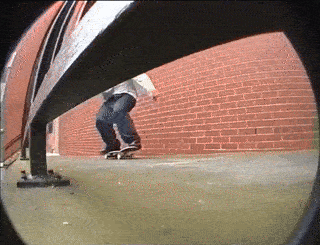 I’m not sure if it was consciously, but when I look at this video, Scott Palmer was one of my favourite skaters, and definitely the biggest influence on the way I skate. He’s a small guy, I always wanted to emulate how he skates fast, he’s like this little ball of power. He also has a simple trick selection, nothing too crazy. It was amazing watching him skate Sheffield spots, the stuff he does at St. James, he does a back 180 then a switch 180 down the stairs. Then he has a line where he does a nollie back heel, then switch flips the seven. That’s so fucked. By the time me and my friends were skating there no-one was doing stuff like that. I remember seeing people frontside flip them and thinking that was gnarly, but him doing lines like that back then is insane. I always loved the back 180, switch 180 line, the symmetry, I love full turning stuff like that in skating.
I’m not sure if it was consciously, but when I look at this video, Scott Palmer was one of my favourite skaters, and definitely the biggest influence on the way I skate. He’s a small guy, I always wanted to emulate how he skates fast, he’s like this little ball of power. He also has a simple trick selection, nothing too crazy. It was amazing watching him skate Sheffield spots, the stuff he does at St. James, he does a back 180 then a switch 180 down the stairs. Then he has a line where he does a nollie back heel, then switch flips the seven. That’s so fucked. By the time me and my friends were skating there no-one was doing stuff like that. I remember seeing people frontside flip them and thinking that was gnarly, but him doing lines like that back then is insane. I always loved the back 180, switch 180 line, the symmetry, I love full turning stuff like that in skating.
I’ve only met Scott [Palmer] a couple of times, I’ve always thought of him as this enigmatic type of skater, how he skates has always been really interesting to me. Simple tricks done really fast, and powerfully. I met him a couple of times when we went to skate that indoor skatepark in Hull, he was really sweet. I always found it interesting that he had that part in Lost & Found and then kind of stepped away. It’s always so cool when people do it like that, put out a few incredible parts and then just dip.
That “tried to be dope” switch hardflip moment lives on as an often-quoted bit of UK skate history.
Yeah it’s so good! Immortalised forever that quote, it’s fucking perfect. I’ve been to that spot too, it’s in Bridlington I think. We did a Sidewalk x Converse seaside trip years ago, and we went there. I’m sure one of us did a line and tried to quote that. The front crook to fakie he does there is sick.
Sheffield had such a sick scene. The premieres for Anthems, and Waiting For The World were held in Sheffield.
I didn’t know that, that’s fucked. It seems to me that back then people travelled between cities a lot more than they would do now. I know the Yardsale lot will trip to Leeds now for instance, but it seems looking back, like people were dipping everywhere back then, beyond just going back and forth to London. It seems like people don’t really do that now, I have so many friends I skate with from London who have never been to Sheffield, or up North really.
Are there any other specific standout moments for you in this video?
I watched it again yesterday and I really love the Ches [Neil Chester], and [Rob] Ransford shared part because of how different their skating is. I love it when people who are totally different have a shared part. I don’t think I was that bothered about that part when I was younger but watching it now, it’s so sick, the shared Post Office thing. I also remember when I first started skating for Converse I met Ches and I was fanning out on him too. I love Ches, he’s so funny. I saw him last year in Amsterdam at some Pop Trading Co thing, he rocked up fully lycra’d out with his bike. I’ll always love this video, I can always watch it happily. it’s short but sweet. Joel [Curtis]’s part, [Mark] Baines’s part, and Scott Palmer’s part will always remain a favourite.
The Invisible Girls – Martin Hannett & Steve Hopkins (2015)
When and how did this record become part of your life?
I actually think the first time I would have heard anything from this was in a Polar video, Pontus [Alv] used a song in I Like It Here Inside My Mind. Don’t Wake Me This Time. I can’t really remember where I heard the album for the first time though. I was really into all of the Factory Records stuff, and knew of Martin Hannett from looking at the credits of stuff like New Order or Joy Division when I was younger. As I got older I started to delve into more stuff like Magazine, Buzzcocks, Chris Sievey, and all that stuff back into Martin Hannett. I found him from listening to some John Cooper Clarke stuff, he produced the Disguise in Love album.
So the Invisible Girls were a band Martin Hannett was in that accompanied John Cooper Clarke?
Yeah, the Invisible Girls were essentially Martin Hannet’s studio band, so when he was producing stuff he would use them, kind of like The Wrecking Crew you would see on Beach Boys stuff. It was a really good in house studio band made up of incredible musicians, he was psycho so just musicians he liked I guess. Obviously it’s Martin Hannett’s brain in the driving seat but it’s such a specific sound to generate, especially with this group of musicians.
You hear it on that Disguise In Love album, especially on this track “Valley of the Lost Women” which is my favourite John Cooper Clarke song, it’s amazing. His spoken word recording with them playing in the background. I wanted to delve more into that, then stumbled across this album. It’s a collection of songs, that are almost like sketches, ideas that Martin Hannett had, some became songs, some didn’t. Each one fades in, most are made up of two parts, then they fade out, Each one is so well produced, and dense, and thick. It’s not an afterthought built around a recording of a guitar track, they’re full songs.
Songs you listen to often?
Yeah, they’re easy to listen to and zone out. It’s my favourite album to walk around and listen to. Recently when I’ve been doing my knee rehab, and spending time in the gym. When I’m trying to avoid listening to my gym music this is one of my favourite albums to listen to, it’s great for running. There are different elements to it where it’s almost like the soundtrack to a Sci-Fi film, other tracks are the classic post punk sound that was around at that time. Then I bought the record which has made me listen to it even more, it’s just become this thing I’ll keep going back to every now and again.
“it’s Martin Hannett’s brain in the driving seat but it’s such a specific sound to generate, especially with this group of musicians”
My understanding of it is that they were making these tracks with the end goal being that someone would pick them to sing over, a more commercial aim.
Yeah they were. That “Time is Slipping” song was recorded for Pauline Murray who sang in that band Penetration. That became one of hers, and then I think he produced her album. I’m not sure what he intended to do with all of them, other than them all being these weird ideas. It’s a compilation of all of these tracks that he got together.
Songs without homes almost?
Yeah, exactly but because he’s so fucking talented they’re all incredible.
When I listened to it, it felt like the first five tracks were definable, or fit into a genre, then it went a bit more off-piste.
Yeah they are like coherent songs for sure, then there’s that “Procession” track, and it starts to get a bit more weird after that. That’s when this Sci-Fi element comes in. I’m looking now at what Pontus [Alv] used for his video, it was “All Sorts Of Heroes” part 3, it’s one at the very tail end of the album. I always looked at that song “Huddersfield Wastes”, I would listen to that a lot, and I always tried to put it forward for videos as a song idea, I think it would be so sick to skate to because it’s so epic. It never got used unfortunately, there are other songs on there which would be amazing to skate to. Because they’re instrumentals, and there’s so much space there I think it would work so well.
I had the album on while working and it was an easy listen, very meditative.
That’s the thing, it doesn’t demand too much from you but it’s really satisfying. Like you say those first four or five songs are really banging, then it becomes weird and meditative after that. I always recommend this to people who like anything he touched. My girlfriend’s mum is really into Magazine, and all those Manchester bands, I gave her this record and she was really hyped on it.
This is an album you’ll play as a whole?
I’ll put the whole record on if I’m tidying the house or something, but I definitely have favourite songs I’ll put on if I’m listening to it on my headphones. I’ll put on “Huddersfild Wastes” or “Time Is Slipping”. It’s quite an intense thing nowadays to find the time to listen to a whole album so I listen to tracks here and there. I definitely get a lot of joy putting the whole thing on while I tidy or something though.
So you maintain buying records?
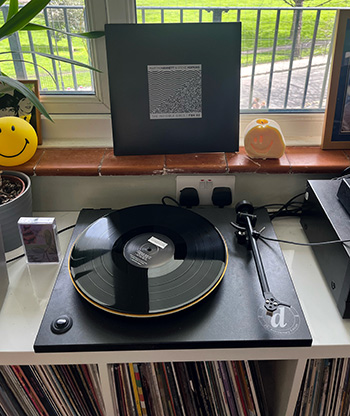 Yeah definitely, my girlfriend had been working at Rough Trade since she was about fifteen, and left when she was about twenty three. She has always worked in music. So I was already a big music head but when I met her I inherited her whole record collection as well. I’ve been trying my best to contribute towards it, she got me into buying records more, and now it’s something I’m really into. We have a real good record shop called Stranger Than Paradise which is next to where we live. It’s run by Noreen [McShane] who used to manage Rough Trade East, and worked with my girlfriend Tallulah. She’s like her second mum so we go there all the time. You could go on for ages and sound pretentious saying that record shops are the closest thing to the skate shop experience, but they really are. It’s sick to have a hub where you can check in, have a flick through, and have a chat.
Yeah definitely, my girlfriend had been working at Rough Trade since she was about fifteen, and left when she was about twenty three. She has always worked in music. So I was already a big music head but when I met her I inherited her whole record collection as well. I’ve been trying my best to contribute towards it, she got me into buying records more, and now it’s something I’m really into. We have a real good record shop called Stranger Than Paradise which is next to where we live. It’s run by Noreen [McShane] who used to manage Rough Trade East, and worked with my girlfriend Tallulah. She’s like her second mum so we go there all the time. You could go on for ages and sound pretentious saying that record shops are the closest thing to the skate shop experience, but they really are. It’s sick to have a hub where you can check in, have a flick through, and have a chat.
Who or what has turned you on to the most music do you think?
The main thing that put me on to music, different stuff, was inheriting my older stepbrother’s iPod when I was thirteen. It had such a good mix of music, and I had no idea how to change what music was on there, just how to charge it. So I had to stick with what was already there but it was packed with so much, loads of 90s hip hop. It was the first time I had listened to Biggie, but also the first time I heard The Smiths. It was such a good starting point, almost like inheriting your brother’s record collection. That gave me a musical compass to begin with. I was lucky to grow up in a generation where Spotify came around, and YouTube meant you could listen to anything and everything. I remember being sixteen scouring for music, and just hitting related videos again and again. It all started with that iPod though.
If someone reads this, listens to this record and wants more, where should they start digging?
If you haven’t already I recommend looking through all of Marin Hannett’s producing credits, there’s a long list, and even if it’s a slightly different sounding artist you can always hear him in the details, how mental he is. I’d investigate the stories of him producing Joy Division stuff, making Stephen Morris play drums on a roof on his own. Read about his methods of recording and how crazy it is, you get a deeper appreciation of his stuff when you realise how crazy his methods were, especially during that time. Go through his discography for sure.
Hearts of Darkness: A Filmmakers Apocalypse (1991)
Talking about crazy methods segues nicely into this. Is this documentary a recent watch?
Totally, without even watching this documentary it’s kind of common knowledge that Apocalypse Now was a fucked up film to make. I had watched the film a couple of times when I was younger. I’m a big documentary head anyway, when I was laid up after my recent surgery I just started watching loads of stuff. This was recommended on a podcast that I listen to so I watched it, and it blew my mind in so many ways. From a production standpoint, to watching Francis Ford Coppola go crazy, then what the actors went through too. It gave me so much respect for acting, seeing how much it affected Martin Sheen’s health. There’s that scene at the beginning of the film when he’s on his own in that room, watching the story and process behind that makes it even better, I just found it really interesting.
His method there is incredible.
It gave me a great appreciation of the craft just hearing him talk about it. He says he wasn’t doing well, and was drinking a lot. He explains that in the scene he was intent on facing this guy head on the guy he had become. That whole scene was almost a cathartic, therapeutic mission. Getting battered, and having it out.
You mentioned parallels with skating.
I think we have the equivalent in skateboarding a lot. Whether it’s Heath Kirchart only wearing white to film a part, or stories about people going crazy because of the process they’ve subjected themselves to. I always find the back stories about what went into getting something really interesting, and this documentary tells the story of the gnarliest version of that in a way.
One of my takeaways was the uncertainty of this thing, Coppola wondering if it was ever going to come to fruition.
It’s a real peek behind the curtain. I guess when you watch films you see them as these big machines, and think of everything being so organised, and well constructed. Then you look at this which is one of the most well-respected films of all time, and realise the director was on this crazy shoot in the Philippines with no idea of how to finish the fucking thing.
Through to completely canning parts of the script, and filming improvised lines.
Yeah, having a call sheet with no title, no plan other than turning up for the day. Making that film has every element to it that makes for a good story. How it was fucked from the get go, how the script comes to happen. The notion of George Lucas entertaining making the thing in Vietnam, during the Vietnam war. I love the idea of the script itself being this untouchable thing no-one wanted to go near. They talk about how Orson Welles was going to convert the story into a movie but made Citizen Kane instead and never did it. It’s the film equivalent of when there’s an equation on the wall that needs to be solved. You’ve got Francis Ford Coppola funding the thing himself, remortgaging his house.
“I love the idea of the script itself being this untouchable thing no-one wanted to go near”
I think Laurence Fishburne was fifteen at the time he was acting in this film but lied about his age to get on the cast. So many little elements about it are so cool. Then the stuff with Marlon Brando at the end is hilarious. I never really think about this stuff, but talking to you now I’ve definitely been on trips with skaters who have the same approach. Rocking up on a trip with no intention of skating, the big skater who rocks up and does fuck all. That’s the equivalent of Marlon Brando in this film, hahaha. Give me a million dollars now, then I’m going to come over there and not do shit. It’s so funny, I love it when Francis Ford Coppola takes note of Brando’s weight, he tells him they can work with it, make him this gluttonous leader. Then Marlon Brando tells him he’s insecure about his weight and doesn’t want to acknowledge it. Coppola couldn’t win.
It would have panned out completely differently if circumstances weren’t pitted against them.
Yeah it makes you think if everything went well what would the film look like. There would have been none of that crazy improvisation from Brando at the end. You wouldn’t have got the same performance from Martin Sheen if he wasn’t so fucked, filming this thing, and having a heart attack fed into his character. If it was an uneventful, successful shoot, how would it have turned out?
They make reference to making this being their own war of sorts.
Oh my god yeah, that piece he [Francis Ford Coppola] delivers at the beginning is so epic. I remember when I first watched the documentary thinking “holy shit, this is going to be amazing” just from what he says. He’s just a film director talking about a film but he could be talking about anything, his words transcend the subject.
He thought he was making a bad piece of work the whole time. It hammered home that even the most talented, successful, award-winning humans are affected by self doubt.
Yeah, he was plagued by these nightmares, or visions of it being a complete failure. That stuff is really reassuring when you’re in any kind of job where you’re making something creative, something that will end up out there to be judged. Knowing that the leading people, or the most respected, are just as insecure as you are. You see him as this obvious movie giant but he’s returning to his wife every night and confiding that he has no idea what is going to happen. It also reinforces that sometimes things made out of pure panic can turn out well. This documentary really resonated with me at the time I watched it, there’s something so interesting about anything you really like which has a crazy story behind it, and this is one of the craziest stories of all.
I loved that Coppola wasn’t precious about guarding this process. His belief being that anyone can make a film. Seeing that more access to technology would mean more filmmakers.
Exactly, he started a production company. He wanted to put a camera in anyone’s hand. I always respected that about him as a filmmaker, he wasn’t guarded about the craft, he wasn’t stuck up about film or directing. He definitely came at it from a more creative standpoint, where anyone can do it, it’s just about doing it.
So you recommend everyone watches the film if they haven’t already, and then checks out the documentary?
I had seen the film a few times, I think I first watched it when I was about seventeen. Then saw it a few years later, and had a different experience with it. But watching the documentary, and then watching the film again, it became a whole different film. That peek behind the curtain is so revealing, like seeing how the sausage is made.
Songs in the key of Z – Irwin Chusid (200)
This book is another musical gift, when did this find you?
This was a present from my girlfriend, she got it for me about a year ago. I don’t think I even asked for it, she just knew to get it for me. The author Irwin Chusid put together this compilation of stories about different outsider musicians. It’s a type of music I have always been obsessed with, beginning with liking Daniel Johnston from a young age, then finding out about The Shaggs and stuff. There’s this whole world of musicians who came into music, recording out of necessity, with no idea of what they were intending to do, or wanting to do. Some of them were trying to be famous, but some of them just have these songs they’ve written and want to record them. It goes back to the Francis Ford Coppola idea of putting a camera in anyone’s hand, it’s kind of the same with music. If all of these people make music just to do it, rather than because they’re good or know how to, you end up with these really incredible things sometimes.
Out of this book I guess Daniel Johnston is a shining example of that. There are other interesting people in it. The thing with outsider music is I’ve always been obsessed with the story of how things came to be, the facts behind things. If I like something I want to know everything about it. I don’t know if you’ve listened to Philosophy of the World by The Shaggs? I think Frank Zappa said that album was one of his favourite of all time. They were these sisters, and the dad was obsessed with making them famous so he bought them all this gear, took a loan out, and paid for them to record. None of them could play their instruments, and they didn’t know how to sing, or write music. Yet they made these weirdly kind of insightful songs, pressed about 100 records, and nothing happened. Over time it became this thing, to the point where we are talking about now. It’s really unlistenable music, but also so innocent. It captured something, you can’t really make something like that, it’s so natural, and weird, and interesting. That’s the thing about recording this stuff, it’s frozen in time forever.
And this guys mission is to preserve their stories and make sure they’re not lost.
Exactly, the guy who wrote the book is interesting himself. Some of the musicians he’s just writing about but others are people he has met. I haven’t read the book for a while but he talks about meeting Wesley Willis in the basement of a venue before he played. That gives it another element, he has really good personal stories about some of the people he’s speaking about, which adds to the sense of character you had about them before. Wesley Willis also made fairly unlistenable music. Some of these artists I would put on the stereo when I worked in the Palace shop to get people to leave, hahaha.
“The reason I love this book so much is because it’s super informative but you can also tell that Irwin Chusid is really passionate about the subject matter”
Wesley Willis would make songs using the pre-loaded tunes on his keyboard. He’d always use the same two or three of those tunes, and add his own story over the top. He was similar to Daniel Johnston, very influenced by comic books, he did songs about Superman or Batman, they were all constructed in a similar way. I think his most famous song is “Rock N Roll McDonalds”. It’s worth checking out. Wth these outsider musicians you always have these incredible personalities behind the music, and crazy stories. The reason I love this book so much is because it’s super informative but you can also tell that Irwin Chusid is really passionate about the subject matter.
This must have opened up some serious avenues of exploration?
There are quite a few people in the book I didn’t know much about who I have been learning about, and listening to. I hadn’t heard about Joe Meek before reading this but I became really interested in his story. He was almost like a British Phil Spector, a crazy music producer who was ahead of his time. He ended up killing his landlady, and then shooting himself when he was in his thirties. He lived on Holloway Road actually, I have seen the house where he used to live, there’s a blue plaque up there. He produced an instrumental song called “Telstar” by The Tornados which was the first record by a British rock band to reach number one in the US charts. He was going to produce the band conventionally but then completely took over this instrumental and it became this hugely successful song which led to him working with other musicians.
I’ve always been interested in music producers and their process, people like Martin Hannett, Brian Wilson, Phil Spector and people like that. Joe Meek is almost a comic book villain version of that. His house was his studio, the drummer would be playing in the living room, they’d be recording backing vocals in the bathroom, someone in every room. There’s a story where he pulled a shotgun on a drummer because he couldn’t play a part right, he held him at gunpoint until he played the drums the way he wanted them. Someone who was such a pioneer, and made all of this incredible stuff, but was a horrific person. He had his own issues going on which contributed to that. You need to check out this space concept album he made called I Hear a New World, at the time no-one made that type of stuff. The title track off that album is so spooky and weird. When you listen to that music and reailse this guy is on Holloway Road in the early 60s, not doing too good, but is recording this music on his own, it’s really interesting. This book led to me going through his back catalogue.
There also people like Harry Partch who was a composer who grew up in Arizona, and then New Mexico. He had a poor upbringing but goes on to become a composer using all of these crazy instruments he made himself. You see pictures of these instruments, and they look like something from Alien. Search for these instruments, they’re in storage, no-one knows how to play them. What I love about this book is it talks about Daniel Johnston, The Shaggs, and Captain Beefheart, classic people you would expect to hear about and associate with this form of music. But then there are characters like Joe Meek or Harry Partch who are completely out there who I may never have come across. Pushing outsider music on anybody isn’ t easy, here’s this horrible music that’s hard to listen to made by people who don’t now how to play, haha. But there are so many different avenues in this book, it encapsulates everything well from Tiny Tim to Syd Barret, it’s all in there, they’ve all got a chapter.
The kind of figures and songs who would be a gatekeepers dream, yet he does the opposite.
Totally, he’s putting you on to all of these people, and lots of them are backed up with his personal accounts. The Wesley Willis encounter I mentioned before is hilarious. Wesley Willis had a big bump on his head because every time he would meet someone he’d give them a headbutt. The author talks about going to meet him to do an interview and getting headbutted super hard as an opener, then the interview was really tense because he seemed unpredictable, he had no idea what he was going to do. It’s really infectious hearing how passionate he is about recounting or presenting this stuff.
This seems like the kind of book you can happily dip in and out of.
It’s great to revisit. When I first started reading this book I went on a trip to Kent with my girlfriend, to the middle of nowhere to stay at a hotel by the sea. I read this book on the train there, then started listening to the Joe Meek stuff which is when I found that “I Hear a New World” song. The place we stayed felt like it had a population of about 200 people, nobody anywhere. I remember going out for a cigarette before I went to bed, and listening to that song. Pitch black, isolated, with a song so eerie and spooky, I’ll never forget it. I’ll forever link together that weekend in a ghostly seaside town with that book, everyone has those associations with certain things. Music paired with an uncommon experience is like smell, it stays with you forever.
Have you got any projects on the boil or trips planned? You’re still in the rehabilitation stage right?
I’m deep in knee rehab at the moment, I’m trying to build that strength back up. I’m hoping to start skating in the next couple of months, getting back into it, and getting things back again. I’m going to be going on a Passport trip to Finland in July because we just put that lad Eetu [Toropainen] on. He’s like the chosen one, so good at skating. He lives in Helsinki so we’re going to do a trip out there, and then go camping around Finland which will be really nice. I’m looking forward to that. Squish [Jack O’Grady], Josh Pall, and a good chunk of the team are going to go. Passport trips are always so fun, they’re always keen to do something outside of the usual skate trips to a city. It’s going to be a good way for me to ease back in to skating, and going on trips.
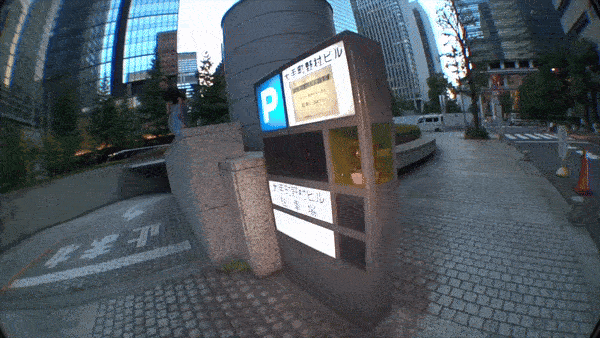
Matlok getting involved on a Passport trip last year. Japanese BSNBS filmed by Geoff Campbell
It’s always good to see you in that mix. How is it being a relatively new addition to the New Balance squad?
They’ve been amazing, I started skating for New Balance about a year ago. I didn’t even talk about the link between Through The Eyes of Ruby and meeting Seb [Palmer] for the first time actually. I loved talking to him about that. I was talking to my girlfriend about this earlier, skateboarding is so weird in that way. I grew up watching that video, watching [Mark] Baines’s part on repeat, then meeting him. He was the first person to ever give me any free stuff really, he used to flow me Fabric boards out of his package when he skated for them. Fast forward ten years later and I’m asking him for shoes, and working with him regularly now.
It was so cool meeting Seb, you know where SUMO used to be? I ended up working in that very same unit, I worked in Size? the shoe shop when it was there years later which is so crazy. It was funny to talk to him about that. I hadn’t met him right up until I first went out to Long Beach to speak to him, we had plenty to talk about. It’s just really cool to get on a new shoe brand, then straight away I’m working with [Mark] Baines, Seb [Palmer], and [Dave] Mackey. It’s so nice, I’m so lucky. Skateboarding is so weird like that, you meet people, and make these relationships which come full circle. Don’t be a dick to someone basically, you might need to hit them up for something in ten years.
Are you sat on any footage?
I actually have a part in [Daniel] Wheatley’s video which should be coming out in around June. He’s finishing up working on that at the moment. It’s going to be good having that come out. Then I’m planning to spend the rest of the year getting back to feeling good on my skateboard, but I want to have something in the works. My main takeaway from being injured is realising how important it is to always be sitting on a little bit of footage. If you get hurt when you’ve got nothing filmed it’s the worst. One thing that’s helped me get through a lot of this injury is knowing that I’ve got a part coming out. From now on I always want to be trying to film even if there’s no major project in the works, I want to be as busy as I can be.
We want to thank Matlok Bennett-Jones for the time he took to speak about the recommendations above which are guaranteed to help you happily while away some hours. We wish him a quick recovery and look forward to seeing him in action very soon. Keep an eye on the Passport Instagram for more updates.
We would also like to thank Neil Macdonald (Science Vs. Life) for the loft visit and VHS photo, and Swift Blazer for the DVD shot. While we are at it we’d also like to thank Neil Chester for making Through The Eyes of Ruby a quarter of a century ago.
Previous ‘Offerings’ Interviews: Spencer Hamilton, Aaron Herrington, Rowan Zorilla, Beatrice Domond, Chris Jones, Kevin ‘Spanky’ Long, Helena Long, Tom Karangelov, Bobby Puleo, Ray Barbee, Zach Riley, Ryan Lay, Casper Brooker


